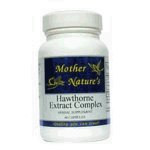|
![[Under Construction]](_borders/undercon.jpg)
| |
Hawthorn
Crataegus monogyna, C. laevigata and related species
Most Frequent Reported Uses:
 | Cardiotonic for arrhythmia/tachycardia. |
 | Congestive head failure. |
 | Irregular heart beats. |
 | Peripheral vascular disorders. |
Other Reported Uses:
 | Angina. |
 | Hypotension/hypertension. |
 | Cholesterol lowering. |
Dosage Range: 250mg (standardized extract), 1 to 3 times a day.
Most Common Dosage: 250mg (standardized extract), 3 times a day.
Standardized to: 2% vitexin, 2 rhamnoside and/or 20% proanthocyanidins per dose.
Toxicities, Cautions and Contraindications: No known toxicities. Should be used
with caution in individuals on antiarrhythmic medications, blood pressure
medications, ACE inhibitors and cardiac glycosides. Hawthorn has the
potential of affecting cardiac rate and blood pressure. If pregnant or nursing, consult a
physician before use. Uteroactivity (reduction in tone and motility) has been documented
for hawthorn extracts. Do not use in children under 2 years of age unless recommended by a
physician.
Active Constituents: flavonoid glycosides, saponins, procyanidins,
trimethylamine and tannins.
Introduction: Hawthorn is used as a vasodilator and circulatory stimulant. It
has been used extensively by doctors in Europe in its standardized form in various
cardiovascular and peripheral circulatory conditions. Its combination of effects on the
heart leads to its use as a tonic, especially for the elderly where mitral stenosis and
minor heart failure may be present. Studies have reported a reduction in blood pressure
due to arteriosclerosis and chronic nephritis with the use of hawthorn. It is also used
for peripheral vascular diseases, such as Raynaud's disease. |

Mother Nature's Hawthorne
Extract Complex - 60 Capsules
Item Number - 1101465
Click to order
Mother Nature's Hawthorne Extract Complex supplies 250 mg. of Hawthorne
extract standardized to contain 1.8% vitexin Rhamnoside and 200 mg. of Hawthorne berries
powder in each capsule. Hawthorne is best known as a cardiotonic. Hawthorne has been shown
to increase the contractile force of the heart and increase the tolerance of the heart to
lower oxygen conditions. Used frequently in cases of congestive heart failure and high
blood pressure. Hawthorne dilates the coronary blood vessels, lowers cholesterol,
increases intracellular vitamin C levels and is useful for anemia, circulatory disorders
and low immunity. Mother Nature's uses the finest herbal extracts (highly concentrated)
that are standardized to indicate an optimal level of freshness, purity and potency |
|
| Pharmacology: Hawthorn is reported to
have the ability to regulate both low and high blood pressure. Its bioflavonoids
reportedly dilate both peripheral and coronary blood vessels. This leads to its use in
decreasing angina attacks. The proanthocyanidin content is claimed to support the
spasmolytic effects Tannin content is thought to be responsible for the coronary
circulatory effects, increasing the amplitude of the heartbeat. Hawthorn's glycoside
component reportedly increases the vagal tone of the heartbeats It is also thought that
hawthorn inhibits angiotensin-converting enzyme's It has a slight diuretic effect which
may help lower high blood pressure. Hawthorn reportedly has the ability to increase
intracellular vitamin C and has a protective effect on oxidative processes. Flavonoid
compounds, such as those found in hawthorn, reportedly have a variety of positive effects
on collagen structure. It has been reported that hawthorn may improve the functioning of
the heart without affecting or increasing coronary blood flow. Lab studies have
reported that proanthocyanidins may actually reverse atherosclerotic plaque.
Comments
Hawthorn is an herb with which all cardiologists should be familiar. The German
Commission E did not grant hawthorn berries a positive assessment since their
effectiveness has not been documented adequately, (compared to preparations made from
extracts of the flower and leaf, which have been positively assessed and approved). Weiss
notes that the flower contains the highest level of active flavonoids. The berry (as a
water extract, water-alcohol extract, wine infusion and fresh juice) has been utilized
traditionally to strengthen and invigorate heart and circulatory function. Extracts used
in Europe are generally standardized from preparations from the leaves and flowers. Tyler
notes that although hawthorn is devoid of adverse side effects, it is not appropriate for
individuals to self-treat any abnormal heart condition. Nevertheless, many normal, healthy
people use hawthorn preparations prophylactically (i.e., protectively) in order to
maintain healthy cardiac function. For more information on the botany, chemistry,
pharmacology, and clinical applications of hawthorn, see the review by Hobbs and Foster (I
990). |
|
|
|
|
Last modified: August 28, 2000
| |
|